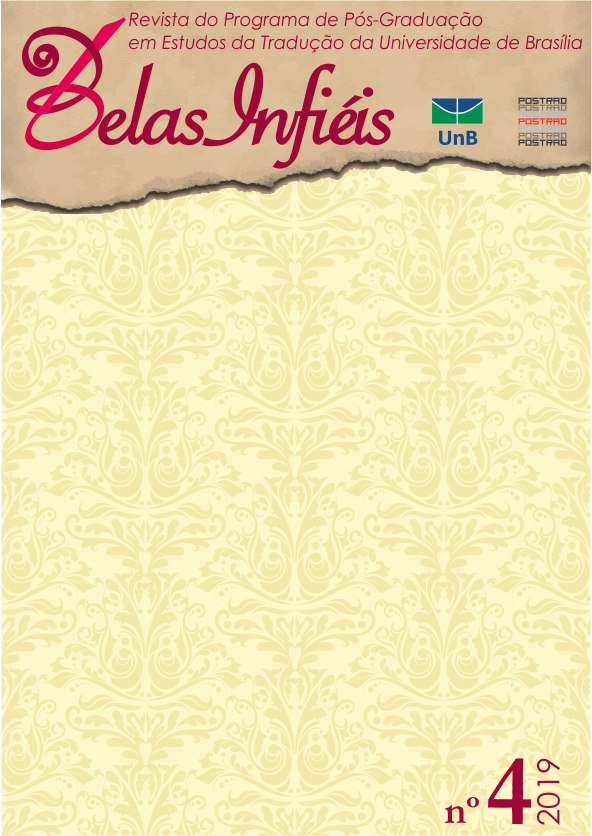A contrastive analysis of bergoglisms in Pope Francis speech corpus
DOI:
https://doi.org/10.26512/belasinfieis.v8.n4.2019.22984Keywords:
Neology. Appraisal. Translation Studies. Corpus Linguistic; Bergoglisms.Abstract
In 2013, Jorge Bergoglio, from Argentina, was elected Pope of the Catholic Church of Rome. The interest in his captivating personality, in addition to be the first Pope of Latin America, has gained preponderance since then, arousing curiosity around the so-called bergoglisms ”“ speaks peculiarly of Pope Francis. The objective of the present work is to analyze the marks of Appraisal in the official papal discourses in Spanish language and in the respective translations into Portuguese. The Vatican's official website makes available, among other texts, the papal discourses translated into various languages. Thus, this work has compiled from this site the discourses made by Pope Francis in Spanish-speaking countries and their respective translations into Portuguese. From this corpus, with subsidies from Corpus Linguistics (BERBER SARDINHA, 2004) and the tools of the WordSmith Tools 6.0 program (SCOTT, 2012), aspects of Appraisal were analyzed around the bergoglisms in both languages. For this, the theory of Appraisal (MARTIN; WHITE, 2005) guided the analyses, through the meanings of the subsystems of Attitude (Judgement, Affect and Appreciation). On the other hand, the neologisms were observed from the classification of Alves (1990). With this theoretical framework and a methodological framework inspired by Novodvorski (2008; 2013), in addition to the tools of Corpus Linguistics, this work analyzed the formation of papal neologisms and the marks of Appraisal printed by the Pope in these neological constructions (bergoglisms), comparing them with the translations into the Portuguese language. To achieve these purposes, in addition to the compilation of the study corpus, it was also appropriate to compile a support corpus, with journalistic articles about the Pope and, especially, about the bergoglisms mentioned. It is hoped that this research will contribute to the corpus-based Studies of Translation and Neology, more specifically from the perspective of the theory of Appraisal and the resources of Corpus Linguistics, since the procedures adopted in this study can also be replicated in other corpora. The theoretical-methodological combination and the choice of the Spanish/Portuguese parallel corpus have proved to be productive.
Downloads
References
ALVES, Ieda Maria. Neologismo: Criação Lexical. 1 ed. São Paulo: Editora Ática, 1990.
BERBER SARDINHA, T. Lingüística de Corpus. Barueri: Manole, 2004.
GALLARDO PAÚLS, Beatriz. Comentario de textos conversacionales: I. De la teoría al comentario. Madrid: Arco Libros, 1998.
HALLIDAY, Michael. Language as social semiotic: The social interpretation of language and meaning. London: Edward Arnold, 1978.
HOUAISS, Antônio. Dicionário eletrônico Houaiss da língua portuguesa. Versão 3.0, 2009.
HURTADO ALBIR, Amparo. Traducción y Traductología: Introducción a la Traductología. 4ª ed. Madrid: Cátedra, 2008.
MARTIN, Jim R.; WHITE, Peter R. R. The Language of Evaluation: appraisal in English. London: Palgrave, 2005.
NOVODVORSKI, Ariel. A representação de atores sociais nos discursos sobre o ensino de espanhol no Brasil em corpus jornalístico. 2008. Dissertação (Mestrado em Estudos Linguísticos) ”“ Faculdade de Letras, Universidade Federal de Minas Gerais, Belo Horizonte, Minas Gerais, 2008.
NOVODVORSKI, Ariel. Estilo das traduções de Sergio Molina de obras de Ernesto Sabato: um estudo de corpora paralelos espanhol/português. 2013. Tese (Doutorado em Estudos Linguísticos) ”“ Faculdade de Letras, Universidade Federal de Minas Gerais, Belo Horizonte, Minas Gerais, 2013.
PARODI, Giovanni. Lingüística de Corpus: de la teoría a la empiria. Madrid: Iberoamericana / Vervuert, 2010.
PERINI, Mário. A. Princípios de lingüística descritiva: introdução ao pensamento gramatical. São Paulo: Parábola Editorial, 2006.
SCOTT, Mike. WordSmith Tools (6.0) [Programa computacional]. Liverpool: Lexical Analysis Software, 2012. Disponível em: http://www.lexically.net/wordsmith/version6/index.html. Acesso em: 5 out. 2019.
WHITE, Peter. R. R. Un recorrido por la teoría de la valoración (Teoría de la valoración). The Appraisal Website. 2000. Disponível em: http://www.grammatics.com/appraisal/spanish_tr/spanishtranslation-appraisaloutline.pdf. Acesso em: 5 out. 2019.
Downloads
Published
How to Cite
Issue
Section
License
Given the public access to this journal, the texts are free to use but requires the recognition of the original authorship and initial publication in this journal to be properly stated.
 The journal allows the use of works published for non-commercial purposes, including the right to submit the work to publicly accessible databases. Published contributions are the sole and exclusive responsibility of the author(s).Â



















